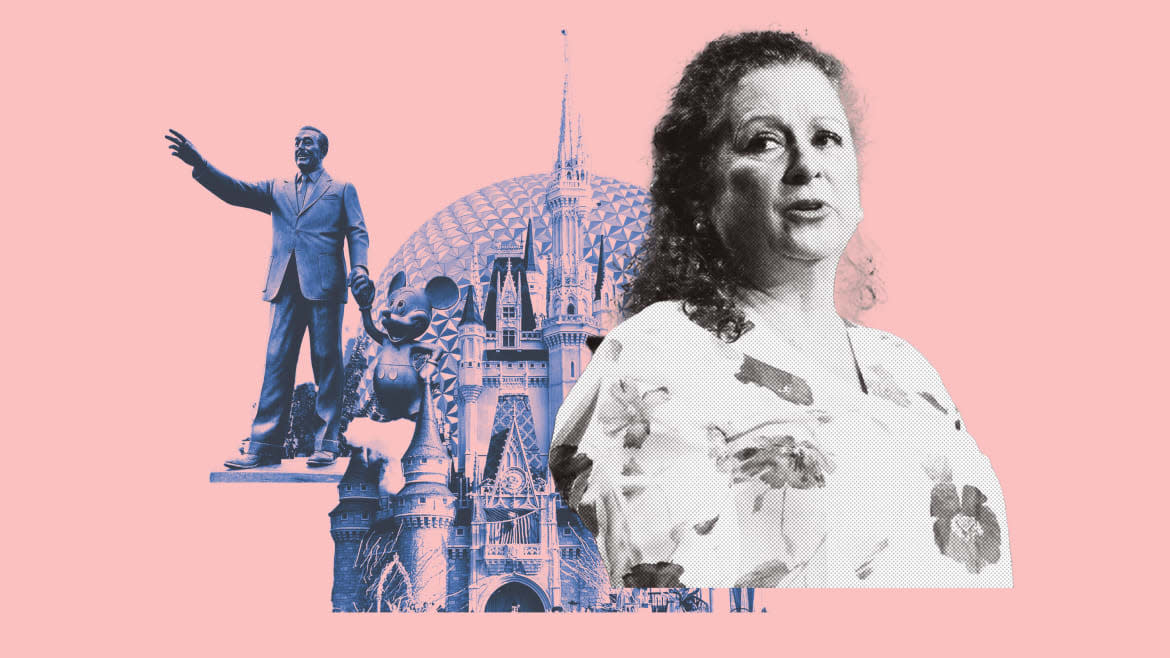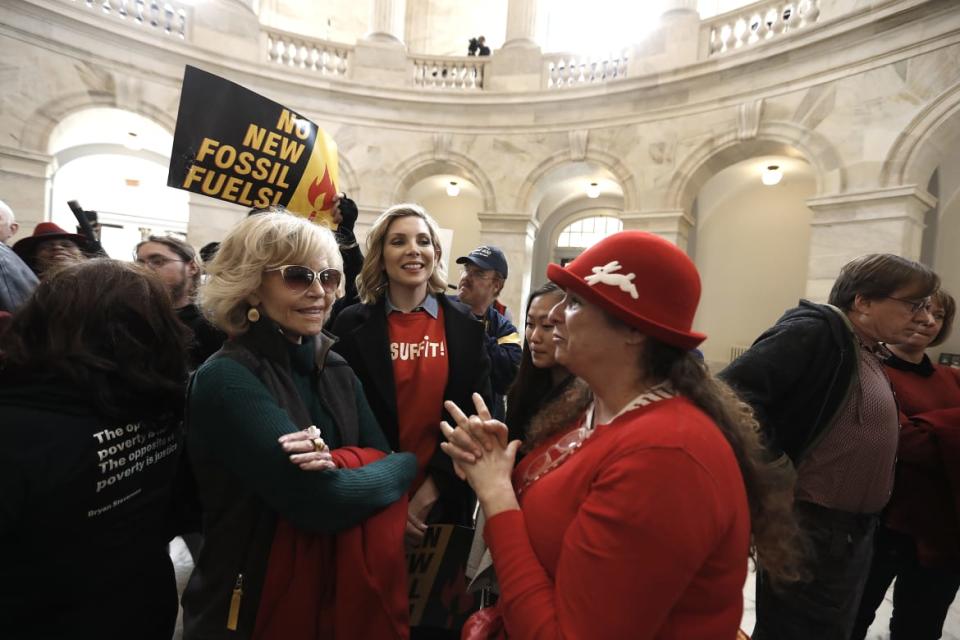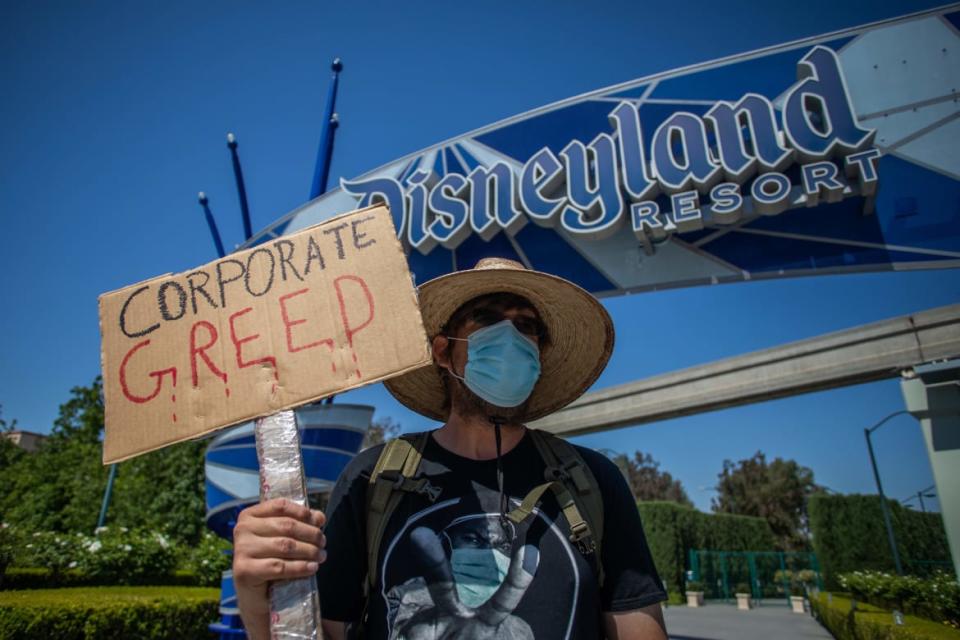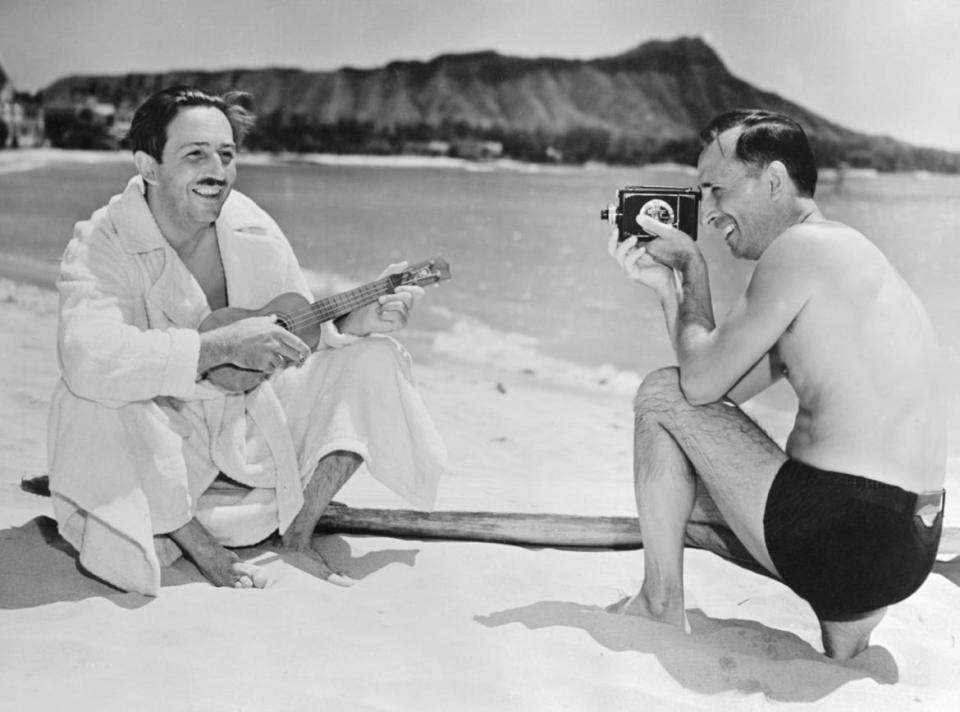This Disney Heiress Is Exposing Her Family Company’s Worker Exploitation—and Sick of Marvel Superhero Movies

- Oops!Something went wrong.Please try again later.
- Oops!Something went wrong.Please try again later.
- Oops!Something went wrong.Please try again later.
“I have a hand in every pot—which means I have a lot of hands,” offers Abigail Disney.
Indeed, the 62-year-old filmmaker, activist, and Disney heiress—her grandfather is Disney co-founder Roy O. Disney, and her beloved great-uncle is Walt Disney—has kept herself busy over the past two decades producing a number of impactful documentaries. Among them are Pray the Devil Back to Hell, about Leymah Gbowee’s peace movement in Liberia; The Invisible War, exploring the sexual-assault epidemic in the U.S. military; Cameraperson, a riveting doc on the life of cinematographer Kirsten Johnson; and On the Record, exposing a number of women’s sexual-assault allegations against hip-hop mogul Russell Simmons. Disney also prides herself on producing features from female filmmakers, including Karyn Kusama’s underrated thriller The Invitation, Jennifer Fox’s The Tale, and Kitty Green’s The Assistant.
But no film of Disney’s has hit as close to home as her latest.
In the new documentary The American Dream and Other Fairy Tales, Disney investigates allegations of worker exploitation within the theme parks that bear her family name, sitting in on meetings with the Disneyland Workers Unions and learning about how many of them are scraping by just to survive. “We’ve had cast members who’ve had to make the decision between medication or food,” one worker tells Disney.
Peter Dreier, professor of politics, urban & environmental policy at Occidental, says in the film that they conducted a survey of Disney employees and the results were astonishing: 1 out of every 10 full-time workers was homeless at some point in the previous two years, and two-thirds didn’t have enough money to pay for food. At the same time, in 2018, Disney’s CEO Bob Iger collected $65 million—or 1,424 times the median salary of a Disney employee. And the pandemic only made things worse.
Workers Reveal Disney Is Covering Up Its COVID Cases
In a wide-ranging talk with The Daily Beast, Abigail Disney opened up about her new documentary and why she’s chosen to shine a light on her family company.
I’m curious about your relationship to Disney growing up. What was your perspective on this huge thing your grandfather and great-uncle had created?
It is weird to come to awareness, slowly, of how big a deal that is. I’m sure Angelina Jolie’s kids and Beyoncé’s kids will have to deal with this slow awakening that happens. Little by little, I started to sense something big was happening. And it was fun, mostly, when I was young, because we would go and tear the place up. But sometimes it was a little bit of a bummer, because there were openings we’d have to show up for in our very nice clothes. We knew we didn’t have a normal relationship to it. My grandfather would sometimes take me there by myself, so I have this emotional relationship to the park because I worship my grandfather. He was so kind and warm. That emotional relationship is part of what’s causing me to invest so heavily now, because it extended to the people who work there.
When did that idyllic vision of Disney that you had as a kid start to show cracks?
In college. I was in college in the late-’70s and early-’80s, so there wasn’t as much distance between that and the McCarthy hearings as there is now. You talk to young people now and they don’t understand how far of a right turn my grandfather and great-uncle took. I went to an Ivy League school, and Ivy Leaguers will let you know about it if your pedigree isn’t right, politically speaking. That’s when I started to develop an awareness and pay attention to, how did I feel about it? How did I relate to these misdeeds from the past? Certainly, for me, Song of the South is one of the worst things I can think of. It was hard because you love your family—you really do—but you see the wrongs. You have to hold these things in your head at the same time. It’s this constant dance between, “I’m proud—it’s wonderful, and so many people love it!” and “There’s all this darkness.”

Jane Fonda, June Diane Raphael and Abigail Disney demonstrate inside the Russell U.S. Senate office building during "Fire Drill Friday" climate change protest on November 15, 2019, in Washington, D.C.
So, I’m assuming you’re in favor of overhauling Splash Mountain then.
Yes! Oh my god. [Michael] Eisner brought the film [Song of the South] out again in the 1980s, and that was its best run. It did better in the 1980s than it did in the 1950s. How dark is that?
That’s dark. And they only made the decision to change Splash Mountain two years ago.
I know, right? So, that’s cynicism in action. At the end of the day, this all comes back to cynicism: “I’m going to pay people as little as I’m legally permitted,” “I’m going to do as little as I possibly legally can,” and “I’m not going to change Splash Mountain, even though it’s the right thing to do, until I’m backed against the wall.”
One thing that’s not explored much in the documentary but did happen is that Disney bought Miramax, Harvey Weinstein’s company. How did you feel about that merger?
I have no illusions about who knew what and when. I mean, let’s be real about this: There’s no way the folks at the top of the company didn’t know what Harvey was and what he was doing—and it wasn’t a dealbreaker. It’s pretty horrifying. My parents were very conservative and strait-laced, and they were always uncomfortable with the deal with Harvey. But Michael Eisner had come in, he was given free reign, and he wanted a studio in the old-school sense. And I think that’s the way a lot of men thought studios were.
Has your outspokenness toward Disney led to a lot of friction between you and members of your family?
My parents and I really, really went at it for years. I didn’t like it. I felt like I was at Donald Trump’s Thanksgiving table. My mom loved Rush Limbaugh and Ann Coulter. She was really on the right wing, and very much in the great new troll tradition of the right wing, which is the baiting, and the owning libs, and all that. It was excruciating for me, because I didn’t want to be in constant opposition. At the same time, there are things I know for sure—that truth is better than not, and justice is better than not. I sound like a Girl Scout, but I’m just trying to be a good person. And, given the cards I was dealt, it’s actually much harder to be a good person when you get born with a lot of resources. The challenges to your moral rectitude are numerous and you have to fight them all the time.
Are the Disney kids like the Roy kids on Succession?
[Laughs] You know, when I started watching that show, I thought, “Oh, I’m Shiv!” Then Shiv took this dark turn and I was like, “Oh, I want nothing to do with Shiv!”
I know you mentioned your mother was very right-wing, but how would you characterize Disney’s politics as a company? We saw what happened in Florida with the Don’t Say Gay bill, where it was revealed that the company had donated to the architects of it, which led to a huge uproar. Do you think there’s a conservative streak that runs through Disney?
I think it’s neither conservative nor liberal. It’s the most ferocious and ugly form of apolitical you can have: pro-money. I wrote an opinion piece in The Washington Post while all of that was happening, and my opinion is: They don’t really care. It’s neither a “woke” company or a “Trumpian” company. It’s purely about the money. End of story. And one of the reasons I’m sad about that, and this is the way the world’s worked for a while now, is it didn’t always work this way. My great-uncle and my grandfather thought of themselves as starting a company that did good in the world. They really, genuinely thought that. And they didn’t see making money as necessarily antithetical to doing good in the world.
They did not do anything right, they didn’t always pay everyone well—they had a big strike in 1941—so I’m not trying to paint them as these saints, but I do know that they saw there was a transcendent purpose to the corporation. They took seriously that if workers spend many of their waking hours there, they should feel like they have meaning, dignity, and respect, and that is what they offered most of their workers, most of the time. My grandfather was very proud that people who worked at Disney Land raised families on their salaries, were able to have houses and send their kids to college. There was an assholification that happened in the ’80s and ’90s. The structure is churning out nothing but assholes, because that’s the only way to succeed. If you say nowadays that you want a company to have a transcendent purpose, they’ll laugh you out of every boardroom in America. And that’s what I’m fighting against.
Any time there’s a hint of something progressive in a Disney movie—like, say, a brief flash of a gay couple in the film Lightyear—conservatives lose their minds. Or Moses Ingram in Obi-Wan Kenobi, who received a torrent of racist backlash just for being a Black woman in a Star Wars series. Why do you think people get so riled up about Disney trying to diversify in order to more accurately reflect the world around them?
The conservatives see those as attempts at bringing real life in this direction, and people who lean liberal—progressives—see those things as just reflections of the way it is. There’s a different theory of change in operation on the two sides, which accounts for the radically different way of understanding things. Disney has matured into a massive multinational corporation that’s traded on the New York Stock Exchange for billions of dollars, so risk is something that must be managed all the time. That is not a consistent way of operating with being creative. So, when they do step out with a gay character or something like that, the executives come running in and say, “Let’s cut that back! Let’s cut that back” and it turns into this nothing-thing.
If we were a creative company, the representation would be happening organically. Disney has a two-headed problem: corporate cynicism and risk-aversion just kills imagination, so the organic expression of what’s genuine in the world can’t break through; and on the other hand, its iconic status, especially for conservatives, creates mayhem whenever they try to step off a really mainstream narrative. It’s a cyclone of these two things hitting each other, and I don’t know how to fix it for them. They have Wall Street saying, “Don’t ever lose money or we’ll kill you,” and they have conservative America telling them, “There’s only one way to roll.” If they continue on the course they’re on with the inability to balance corporateness with imagination, I think they’ll eventually start losing money. And then they’ll have to either change or die.

A man holds a sign in front of Disneyland Resort calling for higher safety standards before its reopening July 17, amid the coronavirus pandemic in Anaheim, California on June 27, 2020.
What led you to first speaking out publicly against Disney? It was the spring of 2019 that you sent some tweets out criticizing CEO Bob Iger’s compensation package and how out of control it was. You mention in the documentary that your grandfather, Roy Disney, made about 78 times the pay of the lowest Disney worker.
Seventy-eight times the lowest and only about 49 times the median workers’ pay. I watch this company closely and know it inside and out. In 2018, I was reached out to by a cast member. There were no cameras. I went out there and wanted to sit, one human being to another human being, and get to know them. I went home, wrote an email to Bob Iger, and got a very unsatisfying answer. It was enraging, in a way, but also unsurprising to me. I thought, “Oh gosh, I should do something about this.” Months went by of me feeling stumped, then I went on CNBC and talked about raising taxes on rich people, and Andrew Ross Sorkin threw me a question about Bob Iger’s salary, and I said, “Jesus Christ himself isn’t worth 500 times his median workers’ pay.” Apparently, that went a little viral. So, I decided to do what Donald Trump does—honestly, Donald Trump was my inspiration—and laid it all out in a series of tweets to get at why I thought the issue was important and mattered to workers.
What were some of the most damning revelations you learned about the way Disney workers are treated?
There’s no way they don’t know that people aren’t putting food on the table. There’s just no way. But what they told me was, “We’ve been polling our workers, and 98 percent of them are very, very happy and proud to be at Disney.” And all I had to do was walk in that room [with workers] and ask them a few questions, and I got the truth. It wasn’t hard to get the truth. I don’t for a minute believe that they don’t know, and if they don’t know, they’re choosing not to know. One of the things that drove me the craziest was that you’d take home $66 million [like Iger] knowing that—at the same company, at the same time, less than 40 miles away, there are people who are not putting food on the table, who aren’t optimistic about the futures of their children. Shouldn’t you be like a ship’s captain and stay on the bridge of the Titanic until everybody is on the lifeboats then you can have your $66 million?
How far has Disney gone to try to shut you up? Has there been surveillance?
I do know that the publicity department has contacted every journalist who’s interviewed me over the last couple of years at some point after the interview’s come out. It started with the op-ed editor at The Washington Post who got an angry phone call demanding corrections when there was nothing wrong. But they haven’t reached out to me once. Not even a little. There may be someone watching my phone or emails—that’s always possible—but I don’t know that. They don’t want to come right at me directly, because they’ll only look bad, but there’s been some weird little right-wing stories, so they may try to seed something somewhere else. I thoroughly expect some kind of attack when the film drops and am waiting to see what it is. But honestly, I don’t give a shit. It only increases visibility for the film. People are welcome to think I’m crazy, and a self-promoting bitch, and whatever else they want to think, but I have nothing to gain by being right about this.
At the end of the film, it’s mentioned that Disney will soon raise its minimum compensation to $18.50 an hour, though you argue that number falls short in places like Anaheim. What fixes would you like to see Disney impose to improve the lives of their workers?
OK, so I’m gonna say something insane now, and people are welcome to think I’m crazy: I want to see Disney become a B Corp. The B Corp movement is very stringent about social justice and transparency. It would be a massive systemic change, and by leaps and bounds the biggest company in the world that would make that move, but it relieves you of the legal obligation to be shareholders-only. There are companies that have shareholders who have voted to take companies B Corp. That’s what I’d like to see. I’d like to see them become the largest socially responsible company in the world, because that’s the only thing that’s in keeping with their brand. And right now, the cynicism is leaking out all over the place and it’s damaging the brand. So, I would like to se it become a company that rejects short-termism and embraces a broad range of social-justice issues, à la what Ron DeSantis wants to never happen ever. But this is bigger than one company.

Walt Disney is shown on the beach at Waikiki playing on a ukulele, while his brother and business manager, Roy, makes him the subject of a movie.
Since you are a filmmaker, and a Disney, I feel compelled to ask what you think about Martin Scorsese’s contention that Marvel superhero films do not qualify as cinema and are merely these assembly-line products meant to generate massive profits—while also pushing small films out of the cinema.
If all you have is risk-aversion you can’t have imagination, and all you get are tentpoles and Marvel superheroes. That is the most risk-averse strategy that will also bring you massive profits. And after the pandemic, nobody’s leaving their couch for anything less than a million special effects. Everything is coming together to kill the small, meaningful drama. I completely agree with what [Scorsese’s] saying. I hate these superheroes. And I know people who love them, and I’m glad for them, but just not if it’s the entire landscape, which is what we have now. It makes me very sad.
There’s a fun scene in the film where you’re about to testify before Congress and you put on your clitoris ring, and you say to the camera, “I like to wear it in the most patriarchal places.” How do you wield the clitoris ring?
I love wielding that thing. It makes me so happy. A handful of people who previewed the film said, “Oh my god—you have to take that out.” And they were all men. I’ve been working around issues that are raised by patriarchy my entire adult life. I was at a dinner with Gloria Steinem and the artist Swoon, and Swoon gave me that. Honestly, every time I’m somewhere where it feels all about patriarchy, I wear that ring. It’s a magic juju ring.
Get the Daily Beast's biggest scoops and scandals delivered right to your inbox. Sign up now.
Stay informed and gain unlimited access to the Daily Beast's unmatched reporting. Subscribe now.

